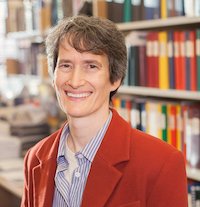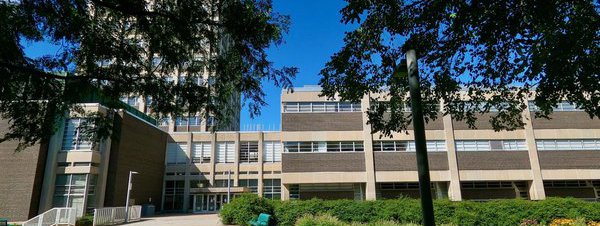
Dear Physics community,
The fall term is marching along, meaning that it is time for a new issue of the Physics Newsletter. This term has seen most of our courses return to an in-person format and the easing of distancing and capacity limits on research activities. While many people continue to work at home, there is certainly a lot more activity in the Physics building these days. On the third floor, we have been joined by Joseph Thywissen, who started his three-year term as Associate Chair for Graduate Studies on July 1.
The Newsletter begins with an interview with Ania Harlick, our new Assistant Professor Teaching Stream whom we were delighted to welcome in September. This issue also profiles CQIQC Post-Doctoral Fellow Ilia Khait, Biological Physics PhD Student Spencer Smyth, and Physics Specialist Kehui (Grace) Li. Our Emeriti Profile features astrophysicist Philipp Kronberg, who retired in 2001, but has remained active in research, including writing a book on Cosmic Magnetic Fields. Our Alumni Profile introduces Stephanie Lim-Reinders, who reflects on her path through physics to her current position as a pediatric resident at the Children’s Hospital of Eastern Ontario.
Kent Moore’s recent work on changes in Arctic sea ice in the Nares Strait between Greenland and Ellesmere Island is highlighted in this issue’s Research Spotlight. More of our recent research stories can be found at Physics News.
Congratulations to our eight June 2021 PhD graduates, and a big welcome to our incoming cohort of 37 new MSc and PhD students who have joined us from across Canada and the world!
The accomplishments of Physics students, staff, and faculty have been recognized with a plethora of awards over the last six months. At our June end-of-year party, Mathew Bub was awarded the Loudon-Hines Gold Medal, and the four recipients of the Van Kranendonk TA Awards were announced: Ramina Alwarda, Sean Colford, John Feng, and Timothy Samuel. Administrative Staff Awards went to Krystyna Biel and Sheela Manek, while Technical Staff Awards went to Pius Santiago and Alex Cui. Also at the party, the Physics Student Union introduced a new annual award to recognize exceptional pedagogy in undergraduate courses; the inaugural recipients were Aephraim Steinberg for PHY256F and Stephen Julian for PHY152S.
Former graduate students Kristof Bognar and Russell Blackport were awarded CMOS prizes, PhD student Liz Cunningham was selected as a UCAR Next Generation Fellow, and PhD student Griffin Schwartz was awarded a Tyler Lewis Clean Energy Research Foundation grant. Also notable were the results of the last two Canadian Association of Physicists University Prize Exams, both announced earlier this fall. U of T undergraduate students had stellar results, taking four of the ten top spots for 2020 and five of the top ten spots for 2021, with Samuel Li placing first in both years.
Meanwhile, our faculty members have also been doing well. Debra Wunch was awarded the CMOS President’s Prize, David Dunlop received the AGU’s John Adam Fleming Medal and Aephraim Steinberg was named a University Professor. Sajeev John was honoured with NSERC's Gerhard Herzberg Canada Gold Medal for Science and Engineering. This is Canada’s most prestigious prize for science and engineering research and was awarded to Sajeev for his pioneering work on photonic band gap materials. And just before we went to press, Henry van Driel was awarded the CAP-COMP Peter Kirkby Memorial Medal for Outstanding Service to Canadian Physics.
Congratulations to everyone on these well-deserved honours!
Our Physics Career Accelerator Program (physCAP) launched in October, with 49 mentor/mentee pairs, and several professional development workshops have been offered to undergraduate students. In August, the inaugural cohort of grade 10 students completed their first year in Pursue STEM, a program to encourage Black and Caribbean students to pursue studies in science, technology, engineering and math. A new group of students will be joining us this year, while the current cohort continues in the program. Other Outreach in Action initiatives include virtual school visits, the Science Unlimited Summer Camp, Girls SySTEM, and the virtual Fall Campus Week.
I’d like to remind everyone that the Physics Colloquium series is well underway and that you can view previous talks or subscribe to the mailing list for future talks at https://www.physics.utoronto.ca/news-and-events/events/colloquium/.
We have two staff anniversaries to mark this fall: both Peter Hurley (Chief Administrative Officer) and Aloma Namasivayam (Finance, Purchasing & uSOURCE Program Administrator) are celebrating 30 years in the Physics Department. In June, we welcomed our newest staff member, Fatima Ijaz, Administrative Assistant for the Earth, Atmospheric and Planetary Physics Group. We also remember Professor Emeritus Allan Jacobs, who passed away on June 30.
To end my remarks on a high note, I am thrilled to introduce three new awards for undergraduate students. The first is the David and Louise Fraser Scholarship, which was recently established with a very generous bequest from the estate of David B. Fraser. David earned his PhD here in 1958 before moving on to Bell Labs and Intel. He has been a long-standing supporter of the Physics Department, with a 30-year record of donations. These scholarships will be awarded annually on the basis of academic merit to undergraduate students enrolled in a Specialist or Major program in Physics or Biological Physics as well as a Major or Minor in another science program. I thank David and his family for their extraordinary generosity to the Department.
The second award is the Richard E. Azuma Summer Fellowship, which has just been announced by TRIUMF. Two Fellowships will be awarded annually to students attending one of TRIUMF’s Member Universities (which include U of T). Students are eligible to hold the paid Fellowship at TRIUMF for four months in the summer break before their final graduating year. This award is named after Dick Azuma, who was a faculty member in the Physics Department from 1961 to 1994, and Chair from 1982 to 1987, and a pioneer in the field of nuclear astrophysics. In keeping with Dick’s dedication to fighting prejudice and discrimination, the Azuma Fellowship is seeking not only students with stellar undergraduate records, but also those with diverse backgrounds, collaborative spirit, creativity, and other attributes that will set them apart as future researchers. I encourage our students to apply!
Back in the Department, we are launching a Fall Appeal to create a new scholarship to support Black and Indigenous students in physics. We’re calling it the Momentum Builders Scholarship, as the goal is to build momentum for greater diversity in physics. We hope that these scholarships will help address systemic barriers — including financial — that prevent Black and Indigenous students from pursuing STEM careers. By doing so, we will create opportunities for these students to achieve their educational goals and contribute their ideas, insights and knowledge to the field, thereby enriching our collective understanding of physics and the universe. To this end, we will also be looking at additional ways we can mentor our Momentum Builders. Donations will be matched dollar-for-dollar, and we already have two pledges that will endow two awards. Please consider making a donation to support a new and diverse generation of physicists.
As always, we welcome your feedback on Interactions – please contact our Editor, Sheela Manek, at newsletter@physics.utoronto.ca with your comments and news.
Professor & Chair

